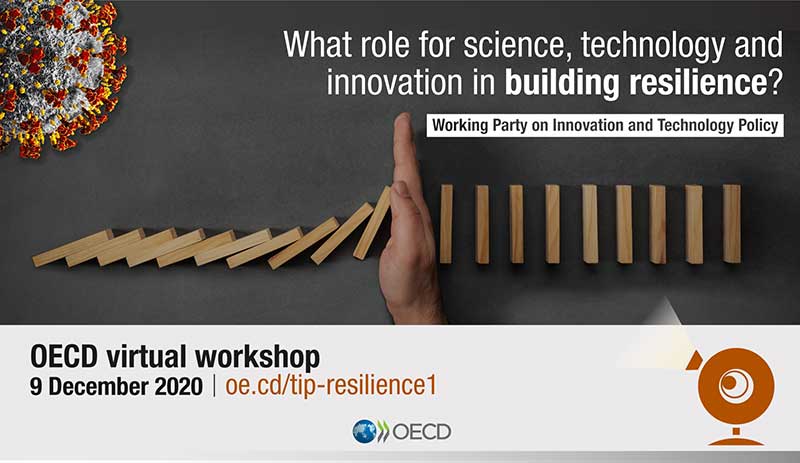Science, technology and innovation policy
What role for science, technology and innovation in building resilience?

 9 December 2020, 12:30-15:40 CET
9 December 2020, 12:30-15:40 CET  Virtual workshop (via Zoom)
Virtual workshop (via Zoom)
- To register please contact caroline.paunov@oecd.org, celia.valeani@oecd.org and chrystyna.harpluk@oecd.org
The ongoing COVID-19 crisis has exposed the fragility of interconnected economies, leading to calls for increased “resilience” in the recovery phase. Proposals for improving resilience – “the ability to anticipate absorb, recover and adapt to unexpected shocks” – have included applying stress tests to the real economy, building stocks of essential goods and reshoring the production of “essential goods”. The OECD’s New Economic Approaches to Economic Challenges (NAEC) initiative emphasizes the need to enhance systems’ capacity not only to anticipate and prevent shocks, but also to recover and adapt in the aftermath of disruption, taking advantage of emerging opportunities following the crises to ‘bounce forward’ towards better systems instead of 'bouncing back’.
This workshop discussed the role of science, technology and innovation systems in supporting resilience to future systemic shocks. STI can contribute to two dimensions of resilience. The first is anticipation, which regards STI to prevent or enhance preparedness to future shocks. The second is agility and responsiveness to shocks, that is, the capacity to quickly adjust to a shock in order to mitigate its negative impacts and take advantage of emerging opportunities.
Agenda
12h00 (CET): Registration in Zoom
12h30-13h15: Welcome and introduction to the topic
- Welcome by the Chair & by the OECD
- Opening video address: Aase Marthe Johansen Horrigmo, State Secretary, Ministry of Education and Research, Norway
- Caroline Paunov (Senior Economist and Head of Secretariat for the OECD TIP Working Party) and Sandra Planes-Satorra (Policy Analyst), OECD Directorate for Science, Technology and Innovation: Insights from TIP work on COVID-19 and resilience [presentation]
13h15-13h45: How can STI systems help prepare for future shocks?
STI systems are critical contributors to the agility and responsiveness of countries to crises. This is well illustrated by the solutions contributed by research and innovation to the COVID-19 crisis, which include improved treatments for severely affected COVID-19 patients and the application of digital tools in the context of social distancing. STI systems can also help prevent future shocks. Developing environmentally sustainable technologies, for instance, is a key to preventing future shocks resulting from global warming. Fostering competencies in critical technology, such as health products or digital infrastructures, may also enhance preparedness for future shocks, including relevant research and innovation capacities across different technology areas. With the COVID-19 challenge debates on building “technology sovereignty” and its implications for international collaboration have gained policy attention.
The objective of this session was to discuss the types of roles STI can play to strengthen resilience by helping improve the anticipation of shocks. Panelists discussed the following questions:
- What roles can STI play in strengthening resilience to future shocks?
- Should STI policies change to help reach this objective? If so, how? What role could technology policy play in increasing resilience to future shocks?
Speakers:
- Catherine Beaudry, Professor and holder of a Tier I Canada Research Chair, École Polytechnique de Montréal [presentation]
- Carl Folke, Professor and Director, Beijer Institute of Ecological Economics of the Royal Swedish Academy of Sciences, and Founder and Chair of the Board of the Stockholm Resilience Centre at Stockholm University
13h45-14h00: Break
14h00-15h30: What new policy tools support more agile and responsive STI policy?
More agile and responsive STI policy can help increase resilience to the ongoing crisis and future shocks. The COVID-19 shock led to unprecedented efforts in experimenting with the use of new tools and data sources for policy. These innovations often built on digital technologies, leveraging the reduced costs of producing and handling information and knowledge and the increased fluidity provided by these tools. Where these were not already applied to STI policy directly, they are illustrative of the potential of new applications and include (1) more granular and more timely data, semantic analysis, big data analytics and visualisation tools and (2) strategic foresight, systems transformation approaches, and tracking tools.
The objective of this session was to discuss what steps can be undertaken to increase the agility and responsiveness of STI systems with respect to new data and data analytics and strategic foresight. Panelists addressed the following questions:
- What data are critical for STI policy in times of crises? What traditional and new data sources have been available during the COVID-19 crisis? Which are important to add to the policy toolbox in the future?
- What about big data for policy? What practical examples of machine learning can support STI policy? Are there examples from the policy practices applied during the COVID-19 shock?
- To what extent does the COVID-19 crisis call for the wider use of strategic foresight in STI policy making? What is critical to make such experiments successful?
Speakers:
Experiments with new tools in other policy fields during the COVID-19 crisis:
- Emmanuel Letouzé, Director and co-Founder, Data-Pop Alliance: Application of tracking tools in the context of COVID-19
- Álvaro Ortiz (Head of Big Data Research and Chief Economist Turkey) and Tomasa Rodrigo (Lead Economist, Big Data and New Tools for Economic Analysis), BBVA Research: Now-casting the COVID-19 shock, including sectoral demand impacts at regional level
- Cosmina Dorobantu, Deputy Director of the Public Policy Research Programme, The Alan Turing Institute: Using data science and AI to build policy resilience against future shocks [presentation]
Experiments’ relevance for STI policies of the future:
- Kazuyuki Motohashi, Professor, Technology Management Department, University of Tokyo
- Juan Mateos-García, Director of Innovation Mapping, NESTA [presentation]
15h30-15h40: Wrap-up and closing
The Chair and OECD Secretariat provided brief conclusions of the outcomes of the workshop and implications for future work of the OECD Working Party on Technological and Innovation Policy (TIP).
Related Documents